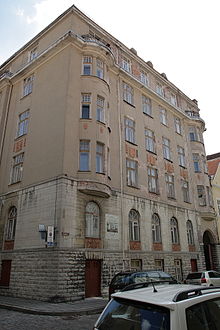The topic of this article may not meet Wikipedia's general notability guideline. (January 2023) |
The KGB Prison Cells (Estonian: KGB Vangikongid) are former prison cells which were used by the KGB in Tallinn, Estonia.[1] The building, known as Pagari 1, also housed the Estonian Provisional Government in March 1918 and the Estonian Ministry of War from 1920-1940.[1][2][3][4]

History
editPre-Soviet era
editPagari 1, when built in 1912, was intended as a residential building. However, in March 1918, the building housed the Estonian Provisional Government. Furthermore, the Estonian War of Independence (1918–1920) was coordinated from Pagari 1. From 1920 until 1940, it housed the Estonian Ministry of War.[2][4][3]
Soviet occupation
editFor almost half a century, Pagari 1 housed the headquarters of the ESSR's People's Commissariat of Internal Affairs, or the NKVD, later known as the KGB. During this time, its cellars were used as prison cells. It also housed an interrogation room.[2][4][3]
1991-
editNowadays, the building has regained its residential purpose, though the basement of the building is used as a museum.[3]
Museum
editThe museum is located in the basement of the building. The museum has one permanent exhibition, ‘History of the KGB House’, and regularly hosts other temporary exhibitions. The museum consists of two corridors, six prison cells and one solitary confinement cell.
‘History of the KGB House’ speaks primarily of the history during the buildings' use by the KGB/NKVD .[2][3]
References
edit- ^ a b "Nei Paesi baltici sulle tracce del Kgb". lastampa.it (in Italian). 2017-11-23. Retrieved 2021-01-01.
- ^ a b c d "Permanent Exhibitions". Vabamu. Retrieved 2023-01-06.
- ^ a b c d e "KGB Prison Cells". militaryheritagetourism.info. Retrieved 2023-01-09.
- ^ a b c Bureau, Tallinn City Tourist Office & Convention; Bureau, Tallinn City Tourist Office & Convention. "KGB prison cells". Visit Tallinn. Retrieved 2023-01-09.
{{cite web}}:|last=has generic name (help)